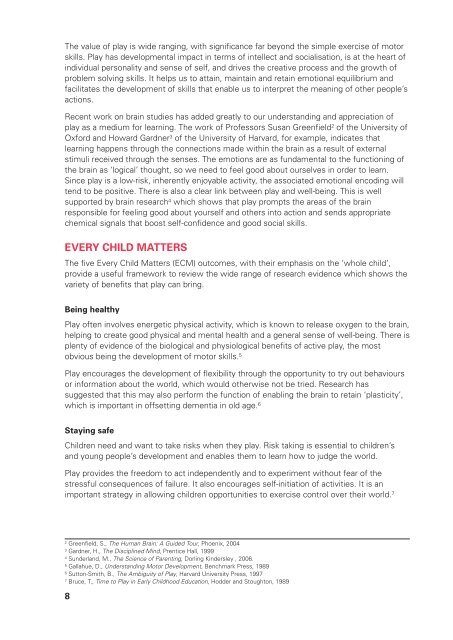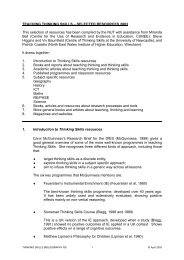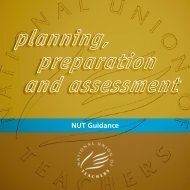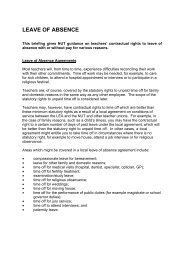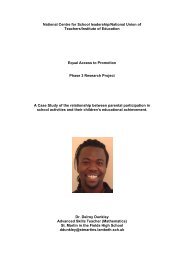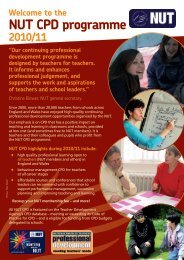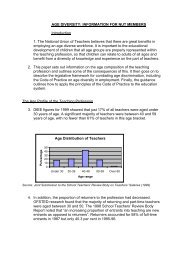NUT play policy - National Union of Teachers
NUT play policy - National Union of Teachers
NUT play policy - National Union of Teachers
Create successful ePaper yourself
Turn your PDF publications into a flip-book with our unique Google optimized e-Paper software.
The value <strong>of</strong> <strong>play</strong> is wide ranging, with significance far beyond the simple exercise <strong>of</strong> motor<br />
skills. Play has developmental impact in terms <strong>of</strong> intellect and socialisation, is at the heart <strong>of</strong><br />
individual personality and sense <strong>of</strong> self, and drives the creative process and the growth <strong>of</strong><br />
problem solving skills. It helps us to attain, maintain and retain emotional equilibrium and<br />
facilitates the development <strong>of</strong> skills that enable us to interpret the meaning <strong>of</strong> other people’s<br />
actions.<br />
Recent work on brain studies has added greatly to our understanding and appreciation <strong>of</strong><br />
<strong>play</strong> as a medium for learning. The work <strong>of</strong> Pr<strong>of</strong>essors Susan Greenfield 2 <strong>of</strong> the University <strong>of</strong><br />
Oxford and Howard Gardner 3 <strong>of</strong> the University <strong>of</strong> Harvard, for example, indicates that<br />
learning happens through the connections made within the brain as a result <strong>of</strong> external<br />
stimuli received through the senses. The emotions are as fundamental to the functioning <strong>of</strong><br />
the brain as ‘logical’ thought, so we need to feel good about ourselves in order to learn.<br />
Since <strong>play</strong> is a low-risk, inherently enjoyable activity, the associated emotional encoding will<br />
tend to be positive. There is also a clear link between <strong>play</strong> and well-being. This is well<br />
supported by brain research 4 which shows that <strong>play</strong> prompts the areas <strong>of</strong> the brain<br />
responsible for feeling good about yourself and others into action and sends appropriate<br />
chemical signals that boost self-confidence and good social skills.<br />
EVERY CHILD MATTERS<br />
The five Every Child Matters (ECM) outcomes, with their emphasis on the ‘whole child’,<br />
provide a useful framework to review the wide range <strong>of</strong> research evidence which shows the<br />
variety <strong>of</strong> benefits that <strong>play</strong> can bring.<br />
Being healthy<br />
Play <strong>of</strong>ten involves energetic physical activity, which is known to release oxygen to the brain,<br />
helping to create good physical and mental health and a general sense <strong>of</strong> well-being. There is<br />
plenty <strong>of</strong> evidence <strong>of</strong> the biological and physiological benefits <strong>of</strong> active <strong>play</strong>, the most<br />
obvious being the development <strong>of</strong> motor skills. 5<br />
Play encourages the development <strong>of</strong> flexibility through the opportunity to try out behaviours<br />
or information about the world, which would otherwise not be tried. Research has<br />
suggested that this may also perform the function <strong>of</strong> enabling the brain to retain ‘plasticity’,<br />
which is important in <strong>of</strong>fsetting dementia in old age. 6<br />
Staying safe<br />
Children need and want to take risks when they <strong>play</strong>. Risk taking is essential to children’s<br />
and young people’s development and enables them to learn how to judge the world.<br />
Play provides the freedom to act independently and to experiment without fear <strong>of</strong> the<br />
stressful consequences <strong>of</strong> failure. It also encourages self-initiation <strong>of</strong> activities. It is an<br />
important strategy in allowing children opportunities to exercise control over their world. 7<br />
2<br />
Greenfield, S., The Human Brain: A Guided Tour, Phoenix, 2004<br />
3<br />
Gardner, H., The Disciplined Mind, Prentice Hall, 1999<br />
4<br />
Sunderland, M., The Science <strong>of</strong> Parenting, Dorling Kindersley , 2006.<br />
5<br />
Gallahue, D., Understanding Motor Development, Benchmark Press, 1989<br />
6<br />
Sutton-Smith, B., The Ambiguity <strong>of</strong> Play, Harvard University Press, 1997<br />
7<br />
Bruce, T., Time to Play in Early Childhood Education, Hodder and Stoughton, 1989<br />
8


